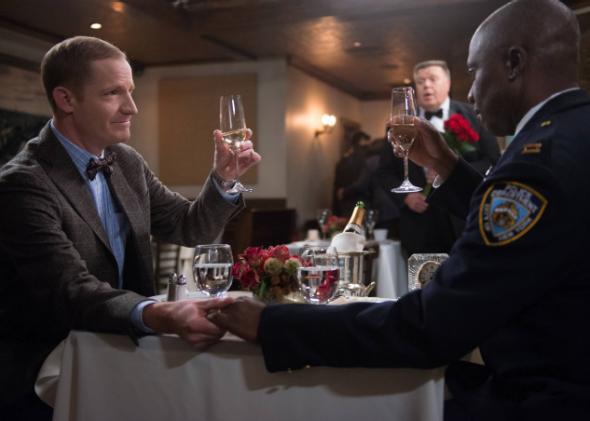Despite winning a Golden Globe for Best TV Comedy—not to mention a massive Super Bowl ad blitz—Fox’s freshman comedy Brooklyn Nine-Nine is still suffering from mediocre ratings, garnering only 3.2 million same-day viewers for last Tuesday’s new episode.* Its Globes win over critical darlings Girls, Parks and Recreation, and Modern Family shocked many in Hollywood. For Brooklyn’s gay fans, however, the award came as no surprise.
These days, mainstream television shows regularly broach LGBTQ topics. ABC’s Modern Family gives viewers a glimpse into the private lives of delightfully flamboyant parents Mitch and Cam. HBO’s Looking somehow eschews any acknowledgement of advances in LGBTQ equality, presenting San Francisco as a dreary post-DOMA dystopia where gay men worry more about foreskins than politics. Netflix brought trans issues to the mainstream with Laverne Cox’s brilliant portrayal of prisoner Sophia Burset in Orange Is the New Black. How could a traditional half-hour sitcom that plays like a combination of The Office and Hot Fuzz possibly break new ground among such company?
Brooklyn Nine-Nine manages to address gay rights thoughtfully with little fanfare. Other mainstream shows strike a self-congratulatory tone when taking on gay issues. Brooklyn quietly brought them to the forefront in the pilot episode, which featured immature Detective Jake Peralta (Andy Samberg) repeatedly embarrassing himself in front of his unforgiving new captain, Ray Holt (Andre Braugher). Holt—an imposing, masculine, black man in a position of authority—is also openly gay. Instead of making his homosexuality the punch line, Brooklyn made the ignorance surrounding it the joke.
In the Feb. 4 episode (“The Party”), Capt. Holt’s husband invites the squad to his home for Holt’s birthday party. In an effort to impress his tightly wound boss, Peralta makes it his mission to curry favor with Holt’s husband, Kevin Cozner, a white Columbia University professor. There is no questioning Holt’s authority because of his sexual orientation, no cringe-worthy “it’s OK to be gay” lesson to be learned, and no big deal made about an interracial same-sex marriage. This is what a post-DOMA show looks like. In its full-frontal embrace of equality, however, Brooklyn Nine-Nine still acknowledges the rapidly transforming landscape for gays in the workplace.
Samberg and the rest of Brooklyn’s talented cast—including Chelsea Peretti, Melissa Fumero, Joe Lo Truglio, Stephanie Beatriz, and Terry Crews—spend the entire evening trying (and failing hilariously) to find out more about Capt. Holt, eventually getting themselves ejected from the party for their egregious invasions of privacy.
Despite their best efforts, no one is able to impress Cozner, who hurls barbs at his husband’s fellow police officers. The following day, Detective Peralta has an epiphany, and he heads to Columbia to offer the professor an apology. “I can’t imagine it’s been fun watching the man you love marginalized, underappreciated, and disrespected by the NYPD,” he says, making a not-so-subtle nod to the horribly unjust workplaces of the past that so many in the LGBTQ community have faced.
In less than a minute, Brooklyn Nine-Nine managed to make a more thoughtful, heartfelt, and compelling argument for ENDA than any other show on prime-time network television. And it did so without losing its sense of humor, keeping viewers laughing, despite the heavy subject matter. The episode ends with Holt and his husband holding hands and drinking champagne at a high-end restaurant, the reservation made by his earnest co-workers as an apology for their failure to be good houseguests.
Samberg (who previously played a bro-ish gay sibling in 2009’s I Love You, Man) shines as a well-meaning but often careless straight man who, when confronted with his own ignorance, reacts with thoughtful compassion instead of hardheaded nonchalance. Thankfully, his character’s revelation of Cozner’s plight doesn’t cause him to exclude anyone from future ribbing or immature pranks, and that’s exactly what makes him so lovable. He’s basically the straight younger brother every gay man wishes he had.
Brooklyn Nine-Nine may start a bit slow, but as Slate’s Willa Paskin pointed out, it has great potential. It takes thoughtful writers to craft funny situations involving sexual orientation without overdoing it. By not forcing LGBTQ moments—and letting them flow naturally—Brooklyn Nine-Nine finally delivers a clever post-DOMA primetime narrative that still shows a commitment to inclusivity. If more real-life employers respected and valued their gay employees this way, perhaps we’d all have more fun at work.
* Clarification Feb. 11, 2014: This piece was amended to note that the 3.2 million viewers cited in the opening paragraph refers to same-day viewing.
